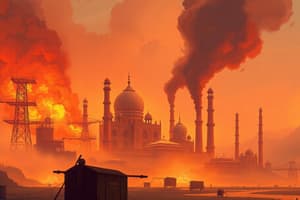Podcast
Questions and Answers
What was the primary aim of Zulfikar Ali Bhutto's industrial policy?
What was the primary aim of Zulfikar Ali Bhutto's industrial policy?
- To privatize industries
- To enhance foreign investment
- To promote industrial development in Pakistan (correct)
- To decrease government control over industries
Which of the following sectors was not nationalized in the first phase under Bhutto's policies?
Which of the following sectors was not nationalized in the first phase under Bhutto's policies?
- Petrochemical industry
- Electric supply company
- Oil refinery
- Textile industry (correct)
What was a significant outcome of the labor reforms introduced by Bhutto in 1972?
What was a significant outcome of the labor reforms introduced by Bhutto in 1972?
- Increased representation for laborers in factory administration (correct)
- Reduction in trade union activities
- Strengthening of the private sector
- Complete elimination of labor strikes
Which of the following was a consequence of the nationalization policy?
Which of the following was a consequence of the nationalization policy?
What agricultural reform was introduced by Bhutto in 1972?
What agricultural reform was introduced by Bhutto in 1972?
In which year was the nationalization of banks and insurance companies completed?
In which year was the nationalization of banks and insurance companies completed?
Which of the following best describes the second round of nationalization initiated by Bhutto?
Which of the following best describes the second round of nationalization initiated by Bhutto?
What impact did nationalization have on the private sector in Pakistan?
What impact did nationalization have on the private sector in Pakistan?
What was the impact of labor reforms on industrial peace?
What was the impact of labor reforms on industrial peace?
What strategy did Bhutto assure to small industrialists regarding nationalization?
What strategy did Bhutto assure to small industrialists regarding nationalization?
Flashcards are hidden until you start studying
Study Notes
Industrial Policy
- Zulfikar Ali Bhutto emphasized industrial development for Pakistan's progress.
- In 1972, he nationalized 32 factories across 10 key industries, including iron, steel, petrochemicals, oil refining, gas, and electricity.
- In September 1973, an additional 40 vegetable oil and ghee manufacturing units were nationalized.
- In January 1974, banks and insurance companies were nationalized.
Labour Reforms
- Labour policy was introduced on February 10, 1972, providing workers representation in factory management.
- Workers were granted bonuses, profit-sharing arrangements, and old-age pensions.
- These reforms promoted trade unionism but led to unrest and industrial instability.
Agricultural Reforms
- Agricultural reforms were declared on March 1, 1972, while Bhutto served as president.
- Land ownership limits were set at 150 acres for irrigated land and 300 acres for non-irrigated land.
- Legal protections were established for tenants and laborers against arbitrary eviction.
Nationalization
- Nationalization aimed to address economic inequalities, with Bhutto committing to state control of major industries.
- In January 1972, 32 heavy industries were nationalized, including sectors like engineering, electricity, gas, and petrochemicals.
- Assurance was given to small industrialists that further nationalization would be limited, but additional industries, including cotton and sugar, were nationalized through 1976.
- Life insurance companies were nationalized in March 1972, while general insurance companies were exempt.
- The State Life Insurance Corporation was established, and all private banks were nationalized by January 1, 1974.
Impacts of Nationalization
- Nationalization fostered equality and aimed at creating a socialist society.
- It strengthened the public sector but introduced bureaucratic inefficiencies.
- Public sector industries significantly contributed to GDP and set the stage for future industrialization.
- Negative effects included weakening the private sector, production declines due to decreased competition, and issues like corruption in public enterprises.
- Overall, these factors hindered economic growth in Pakistan.
Studying That Suits You
Use AI to generate personalized quizzes and flashcards to suit your learning preferences.




